We may not have the course you’re looking for. If you enquire or give us a call on +48 221041849 and speak to our training experts, we may still be able to help with your training requirements.
We ensure quality, budget-alignment, and timely delivery by our expert instructors.
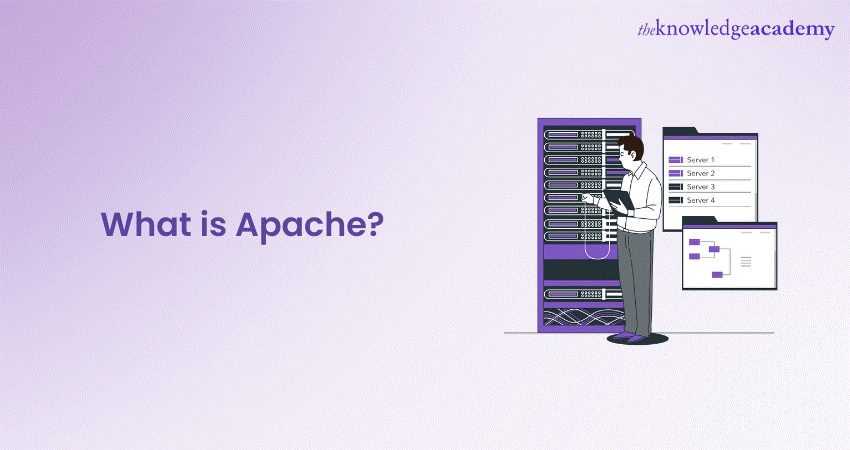
Apache, not just a Native American tribe, is synonymous with the open-source powerhouse, I.e. the Apache HTTP Server. Apache is a name often encountered in the world of Web Development and server management, but What is Apache, and how does it work?
From its roots in the '90s to its modular evolution, Apache has become synonymous with web hosting, powering myriad websites globally. If you are interested in learning "What is Apache, and how does it work?" then this blog is for you.
Table of Contents
1) What is Apache?
2) How does Apache work?
3) Advantages and disadvantages of Apache
4) Apache versions
5) Alternatives of Apache HTTP server
6) Apache HTTP Server vs. Tomcat
7) Conclusion
What is Apache?
Apache, specifically referring to the Apache HTTP Server, is a renowned open-source web server software that has played a pivotal role in the development of the World Wide Web. Initially emerging from the National Center for Supercomputing Applications (NCSA) in the mid-1990s, Apache swiftly evolved into a versatile and widely adopted solution for hosting websites and web applications.
What sets Apache apart is its modular architecture, allowing users to customise and extend its functionality to meet diverse requirements. Its cross-platform compatibility enables seamless deployment across various operating systems, making it a flexible choice for developers and system administrators.
Apache's significance is further emphasised by its robust security features, including encryption protocols and access control mechanisms, addressing the paramount need for safeguarding web servers and user data.
With a rich set of core and extended modules, Apache can handle everything from basic HTTP functions to complex content handling. This makes it a go-to solution for web hosting, enterprise applications, and intranet services.
As an enduring symbol of open-source collaboration, Apache continues to be a driving force in Web Development, empowering digital experiences across a multitude of online platforms.
How does Apache work?
Apache works as a powerful and flexible web server, efficiently handling client requests and delivering web content. Its functionality can be understood through its modular architecture and the sequential processing of incoming requests. Have a look at its working in detail:
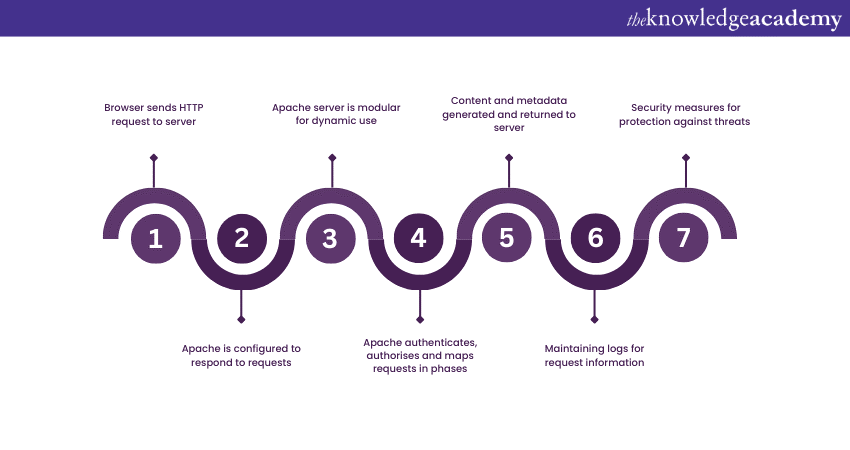
Client request handling
When a user accesses a website or web application, their browser sends an HTTP request to the server hosting the content. Apache listens for these requests on a specified port, typically port 80 for unsecured connections or port 443 for secured connections using SSL/TLS.
Configuration
Apache's behaviour is highly configurable through its settings, which are defined in configuration files. These settings determine how Apache responds to different types of requests, including which modules are loaded, security parameters, and other server-wide and site-specific configurations.
Modular architecture
Apache's strength lies in its modular design. The core server handles basic functionality, while additional modules provide extended features. Modules can be loaded or unloaded dynamically, allowing users to tailor the server's capabilities to their specific needs. Examples of modules include mod_ssl for encryption, mod_rewrite for URL manipulation, and mod_proxy for proxying requests.
Request processing
Upon receiving an HTTP request, Apache processes it in a sequence of phases. This includes authentication, authorisation, and URL mapping. The request is then passed to the appropriate module based on the URL and configuration. Modules may generate dynamic content through server-side scripting languages like PHP or retrieve static content from the file system.
Response generation
After processing the request, Apache generates an HTTP response, which includes the requested content and associated metadata. This response is sent back to the client's browser, completing the communication cycle.
Logging and monitoring
Apache maintains detailed logs, capturing information about each request, response codes, and server performance. These logs are invaluable for troubleshooting, performance analysis, and security auditing.
Security measures
Apache incorporates various security features to protect against common threats. It supports encryption through SSL/TLS, enabling secure communication between the server and clients. Access control mechanisms, such as .htaccess files, allow administrators to define user permissions and restrict unauthorised access to resources.
Learn to apply shell commands by signing up for our Apache Cassandra Training now!
Advantages and disadvantages of Apache
Below are the numerous advantages and disadvantages of Apache:
Advantages of Apache
Here are the various advantages of using Apache:
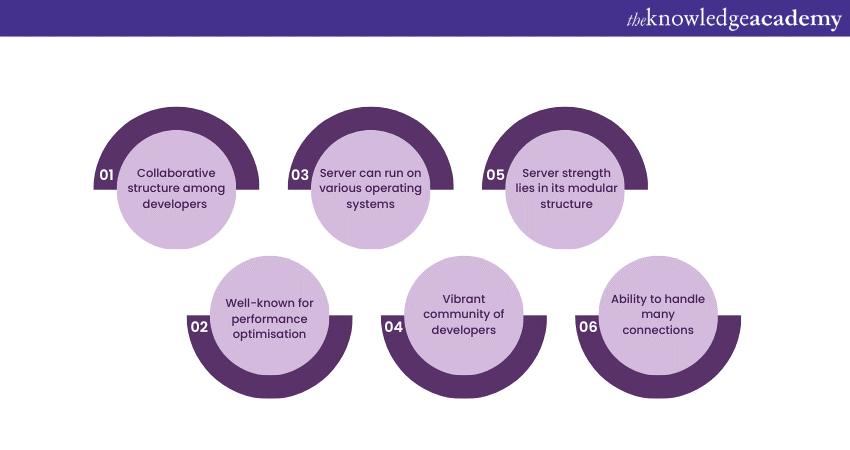
a) Open-source nature: One of the significant advantages of Apache is its open-source nature. The availability of the source code allows developers to view, modify, and distribute it freely. This fosters a collaborative environment, encouraging continuous improvement, innovation, and a large community of contributors.
b) Cross-platform compatibility: Knowing how to Install Apache On Windows, as well as being familiar with its deployment on Unix and Linux, provides developers and system administrators with valuable cross-platform experience. This cross-platform compatibility ensures that Apache can be deployed in diverse environments, catering to various hosting needs.
c) Modularity and extensibility: Apache's modular architecture is a key strength. Its functionality is divided into modules, allowing users to customise and extend the server by adding or removing modules based on specific requirements. This modularity enhances performance and facilitates tailored configurations.
d) Security features: Security is paramount in the digital landscape, and Apache incorporates robust security measures. Support for SSL/TLS encryption, access control mechanisms, and authentication features contribute to creating a secure environment for web servers and applications.
e) Performance optimisation: Apache is renowned for its performance optimisation capabilities. System administrators can fine-tune and optimise the server to handle a large number of concurrent connections efficiently. This makes Apache suitable for high-traffic websites and applications.
f) Community support: The Apache Software Foundation (ASF) fosters a vibrant community of developers, administrators, and users. This community support is invaluable for problem-solving, sharing best practices, and staying updated on the latest developments in web server technology, while also providing insights into the Advantages and Disadvantages of Apache Spark.
Master Apache Spark and big data frameworks—download the Apache Spark Guide now!
Disadvantages of Apache
Here are the various disadvantages of using Apache:
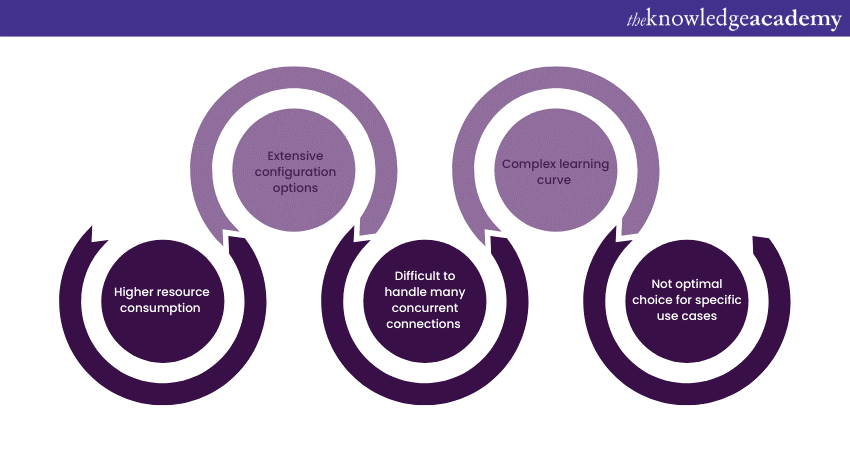
a) Resource usage: In certain scenarios, Apache may be criticised for its resource usage, especially when compared to alternative web servers like Nginx. However, the Apache Spark Architecture offers a more efficient handling of large datasets, as it can optimise memory usage with in-memory processing, whereas Apache's process-based architecture, where each connection is handled by a separate process or thread, can lead to higher memory consumption, particularly under heavy loads.
b) Complex configuration: Apache's extensive configuration options, while providing flexibility, can be overwhelming for beginners. The learning curve for configuring and optimising Apache may be steeper compared to more lightweight alternatives.
c) Concurrency model: Apache's traditional process-based concurrency model may not be as efficient in handling a large number of simultaneous connections as newer alternatives to Apache, such as Nginx, which follows an event-driven model. This can impact the server's scalability in certain scenarios.
d) Learning curve: The richness of Apache's feature set comes at the cost of a learning curve. Administrators and developers new to Apache may find it challenging to navigate and fully leverage its capabilities without adequate training or experience.
e) Not ideal for some use cases: While Apache excels in many scenarios, it may not be the optimal choice for certain specialised use cases. For example, in scenarios requiring a high volume of concurrent connections for serving static content, more lightweight solutions like Nginx might be preferred.
Read and analyse data efficiently by signing up for our Apache Kafka Training Course now!
Apache versions
Here are the two versions of Apache, described in detail:
1) Apache Version 1.1
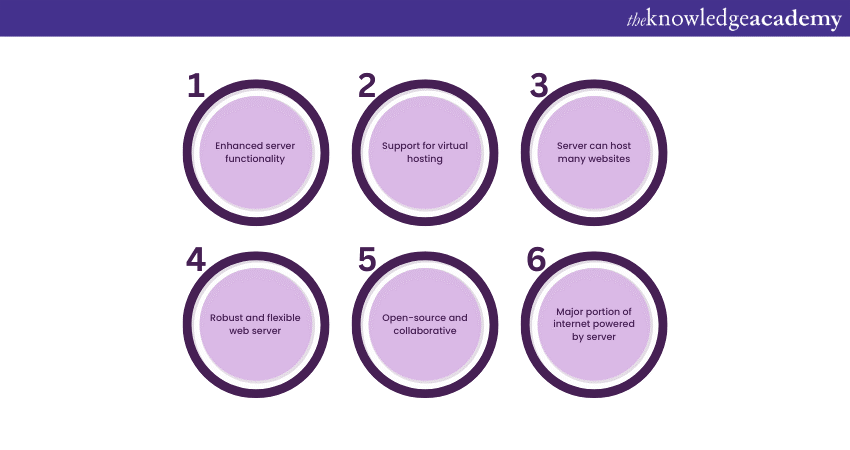
Apache Version 1.1, released in 1996, marked a significant step in the evolution of the Apache HTTP Server. During this phase, developers focused on enhancing the server's core functionality and stability. Version 1.1 introduced features like support for virtual hosting, enabling a single server to host multiple websites with distinct domain names.
Additionally, improvements in performance and bug fixes were implemented to refine the server's reliability. This release solidified Apache's reputation for being a robust and flexible web server. The continued commitment to open-source principles and collaborative development laid the groundwork for subsequent versions, contributing to Apache's enduring success in powering a substantial portion of the internet.
2) Apache Version 2.0
Apache Version 2.0, unveiled in 2002, marked a significant milestone in the development of the Apache HTTP Server. This release brought forth a range of new features and improvements, emphasising modularity and enhanced flexibility. One of the key introductions was a refined multi-processing module, providing better scalability and performance. Version 2.0 also introduced a novel connection processing architecture, allowing for more efficient handling of simultaneous connections.
Additionally, Apache 2.0 enhanced support for various operating systems and introduced a more robust authentication framework. The adoption of a new license, the Apache License 2.0, reinforced the project's commitment to open-source principles and facilitated compatibility with a broader range of software licenses.
Furthermore, Apache 2.0 demonstrated a continued focus on security with the implementation of advanced filtering mechanisms and an improved API for developing custom modules. This version cemented Apache's position as a versatile and secure web server capable of meeting users' evolving demands.
Unlock your full potential by mastering these NGINX Interview Questions. Start your prep now!
Unlock Your Apache Spark Career – Get Prepared with These Key Apache Spark Interview Questions!
Alternatives of Apache HTTP server
Below are the various alternatives to the Apache HTTP server:
1) Nginx
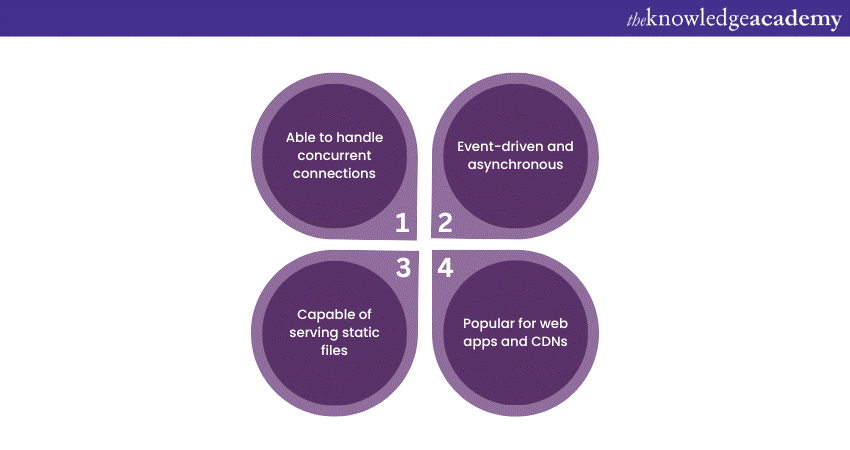
Nginx, pronounced "engine-x," is a high-performance, open-source web server known for its efficiency in handling concurrent connections and delivering static content. It excels in scenarios with a large number of simultaneous requests.
Nginx employs an event-driven, asynchronous architecture, making it particularly adept at serving static files and acting as a reverse proxy. Its minimal resource footprint and ability to handle a high volume of connections make it a popular choice for web applications and Content Delivery Networks (CDNs).
2) Apache Tomcat
While Apache HTTP Server is designed to serve static content, Apache Tomcat specialises in dynamic content through the implementation of Java Servlets and JavaServer Pages (JSP). Functioning as a Java Servlet container, Tomcat is widely used for deploying Java-based web applications. It provides a robust and scalable environment, supporting the Java Platform, Enterprise Edition (Java EE). Tomcat's focus on Java applications and servlets makes it a crucial component in the Java Web Development ecosystem.
3) Node.js
Node.js is not a traditional web server but a JavaScript runtime built on the V8 JavaScript engine. It excels in handling asynchronous I/O operations, making it highly efficient for building scalable and real-time applications. Node.js enables server-side JavaScript execution, allowing developers to use the same language on both the client and server sides. Its event-driven, non-blocking architecture makes it suitable for applications with a large number of concurrent connections, making it popular for building modern, data-intensive real-time applications.
4) Lighttpd
Lighttpd, or "Lighty," is a lightweight, high-performance web server known for its speed and low memory footprint. It excels in serving static content and handling many connections efficiently. Lighttpd's design prioritises speed and simplicity, making it a suitable choice for scenarios where resources are constrained and performance is critical.
5) Cherokee
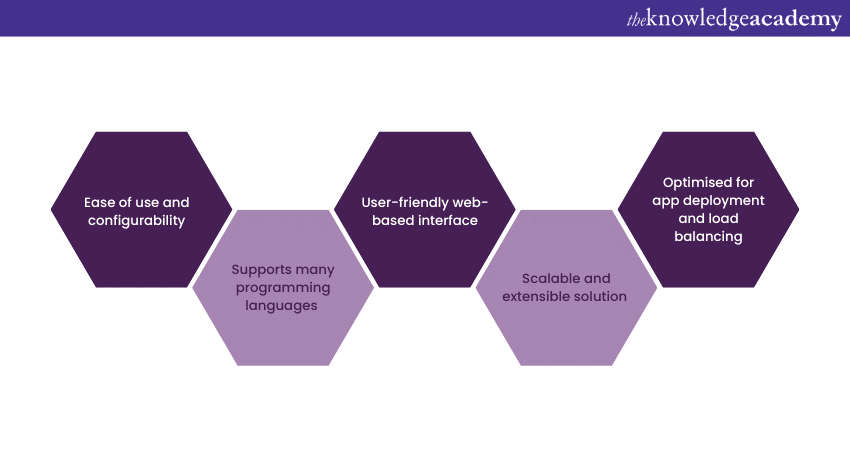
Cherokee is a flexible, open-source web server that emphasises ease of use and configurability. It supports multiple programming languages and features a user-friendly web-based interface for configuration. Cherokee aims to provide a scalable and extensible solution for web hosting, application deployment, and load balancing.
6) Microsoft IIS
Microsoft Internet Information Services (IIS) is a web server developed by Microsoft, designed specifically for Windows environments. IIS supports various web technologies, including ASP.NET, making it a natural choice for organisations heavily invested in Microsoft technologies. It integrates seamlessly with other Microsoft products and provides a robust platform for hosting .NET applications.
7) Appweb
Appweb is a lightweight, embedded web server designed for embedded systems and IoT devices. Its minimal resource requirements make it suitable for environments with limited hardware resources. Appweb's focus on efficiency and small footprint positions it as a practical solution for scenarios where traditional web servers might be too heavyweight.
8) Hiawatha
Hiawatha is a secure and easy-to-configure web server known for its emphasis on security features. It provides built-in support for URL rewriting, anti-SPAM features, and secure CGI execution. Hiawatha's focus on security and simplicity makes it an appealing choice for administrators seeking a straightforward and secure web server solution.
Master the art of data processing by signing up for our Apache Spark Training now!
Apache HTTP Server vs. Tomcat
Both Apache HTTP Server and Tomcat serve distinct purposes, which are described in the table below:
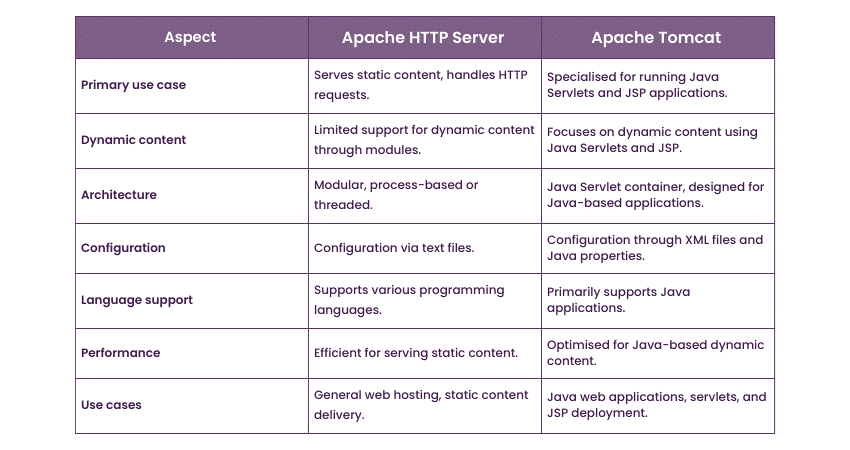
Create, deploy and manage your server by signing up for our Apache Web Server Training now!
Conclusion
We hope that you have read this blog and understood "What is Apache, and how it works?" With a deeper understanding of Apache and its alternatives, you are better equipped to navigate the intricacies of modern web technology. For those preparing for an Apache-related role, refering to resources on Apache Interview Questions can further enhance your knowledge and help you excel in the interview process.
Frequently Asked Questions
What is Apache used for?

Apache, a prominent open-source web server, serves as the backbone for websites worldwide. Its modular architecture and cross-platform compatibility make it ideal for hosting a spectrum of content, from static pages to dynamic applications.
What is the role of Apache on the internet?

Apache seamlessly delivers web content, acting as a bridge between users and websites. Apache also interprets and responds to HTTP requests, ensuring efficient communication. Its robust, modular design accommodates diverse hosting needs, making it the preferred choice for web applications and intranet services.
Who is Apache owned by?

Apache, as an open-source project, is collectively owned and governed by the Apache Software Foundation (ASF). The ASF operates as a nonprofit organisation dedicated to fostering collaborative development and innovation.
What are the other resources and offers provided by The Knowledge Academy?

The Knowledge Academy takes global learning to new heights, offering over 3,000 online courses across 490+ locations in 190+ countries. This expansive reach ensures accessibility and convenience for learners worldwide.
Alongside our diverse Online Course Catalogue, encompassing 19 major categories, we go the extra mile by providing a plethora of free educational Online Resources like News updates, Blogs, videos, webinars, and interview questions. Tailoring learning experiences further, professionals can maximise value with customisable Course Bundles of TKA.
What is the Knowledge Pass, and how does it work?

The Knowledge Academy’s Knowledge Pass, a prepaid voucher, adds another layer of flexibility, allowing course bookings over a 12-month period. Join us on a journey where education knows no bounds.
What are related Apache Courses and blogs provided by The Knowledge Academy?

The Knowledge Academy offers various Programming Training related to Apache, including Apache Cassandra, Apache Maven Training and Apache Kafka Training. These courses cater to different skill levels, providing comprehensive insights into Apache Interview Questions.
Our Programming & DevOps Blogs cover a range of topics related to Apache, offering valuable resources, best practices, and industry insights. Whether you are a beginner or looking to advance your Programming & DevOps skills, The Knowledge Academy's diverse courses and informative blogs have you covered.
Upcoming IT Infrastructure & Networking Resources Batches & Dates
Date
 Apache Spark Training
Apache Spark Training
Thu 22nd May 2025
Thu 17th Jul 2025
Thu 18th Sep 2025
Thu 20th Nov 2025






 Top Rated Course
Top Rated Course



 If you wish to make any changes to your course, please
If you wish to make any changes to your course, please


